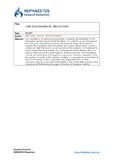| dc.contributor.author | Makridakis, Spyros | |
| dc.contributor.author | Bernand, Majani | |
| dc.date.accessioned | 2015-12-08T08:15:16Z | |
| dc.date.available | 2015-12-08T08:15:16Z | |
| dc.date.issued | 1977-04 | |
| dc.identifier.issn | 0024-6301 | |
| dc.identifier.uri | http://hdl.handle.net/11728/6365 | |
| dc.description.abstract | Can recessions, or serious turning points in general, be predicted? Or do forecasters tend to assume that the future will continue as an extension of the near past. Theoretical evidence and practical observations tend to support the hypothesis that forecasters are unduly influenced by current events and feel that booms or contractions in the economy will continue for much longer than they actually do. In the opinion of the authors this is a serious shortcoming of a good majority of those involved with forecasting who do not seem to be learning from experience. The basic question which the authors consider in this article is whether it is possible to avoid either of the two extremes. If this is possible, they argue that this will allow economic signs to be correctly interpreted, which ‘quite often can give clear indications of forthcoming changes in the level of economic activity’. | en_UK |
| dc.language.iso | en | en_UK |
| dc.publisher | Elsevier Ltd | en_UK |
| dc.relation.ispartofseries | Long Range Planning;Vol. 10, iss. 2 | |
| dc.rights | Copyright © 1977 Published by Elsevier Ltd | en_UK |
| dc.rights.uri | http://creativecommons.org/licenses/by-nc-nd/4.0/ | en_UK |
| dc.subject | Research Subject Categories::SOCIAL SCIENCES::Business and economics | en_UK |
| dc.subject | Research Subject Categories::SOCIAL SCIENCES::Statistics, computer and systems science | en_UK |
| dc.title | Can recessions be predicted? | en_UK |
| dc.type | Article | en_UK |
| dc.doi | 10.1016/0024-6301(77)90118-2 | |


